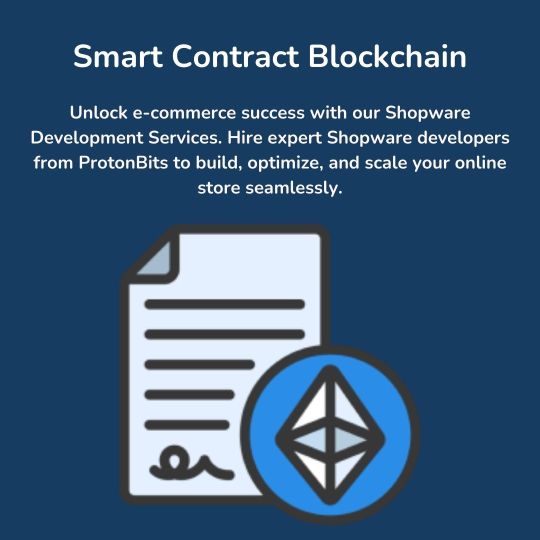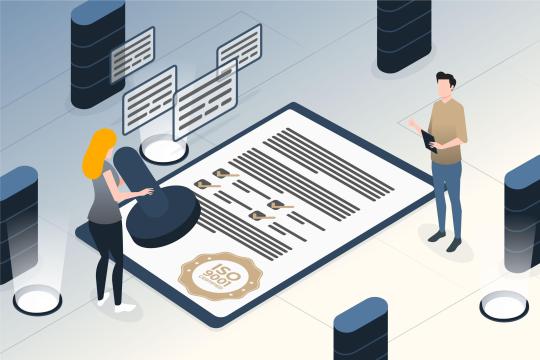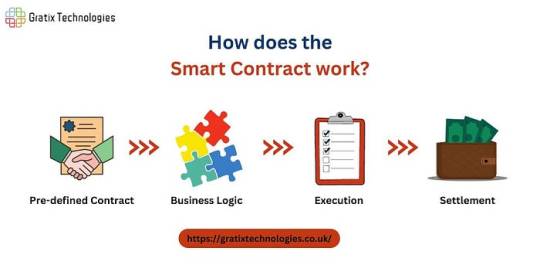#smart contract software
Explore tagged Tumblr posts
Text
Smart Contract and Blockchain Development Services | Hire Expert Smart Contract Blockchain Developers
As a leading provider of smart contract and blockchain development services, we specialize in creating secure, automated solutions that enhance transparency and efficiency. Our team of expert developers is dedicated to delivering cutting-edge blockchain technology to help businesses streamline operations and ensure trust in every transaction. Hire our skilled professionals to implement robust solutions tailored to your needs.

#smart contract blockchain#blockchain smart contract developer#smart contract api#smart contract integration#smart contract#smart contract development#smart contract development company#smart contract in blockchain#smart contract developer#smart contract development agency#smart contract company#smart contract developers#smart contract service#blockchain smart contract development agency#blockchain smart contract development company#best smart contract development company#hire smart contract developer#smart contract companies#hire smart contract developers#hire blockchain smart contract developer#smart contract consulting#smart contract software
1 note
·
View note
Text
AI-Powered Smart Contracts: The Future of Autonomous Blockchain Agreements

Blockchain generation is reshaping various industries, and smart contracts are playing a pivotal role in accelerating decentralization. These self-executing agreements, constructed into code, eliminate intermediaries and provide steady, transparent, and efficient answers. In this text, we discover the significance of Smart Contract Development, Audit Services, DeFi smart contracts, Solana smart contracts, and MLM software powered by way of blockchain generation.
At Security Tokenizer, we offer end-to-end smart contract development offerings, providing custom contracts, auditing, DeFi answers, and MLM blockchain software. Our solutions are secure, efficient, and fully compliant with regulatory standards.
What is Smart Contract Development?
Smart contract development is the system of designing, coding, and deploying self-executing agreements on blockchain systems. These digital contracts robotically execute moves whilst predefined situations are met, disposing of the need for intermediaries. Developed the usage of programming languages like Solidity (for Ethereum) or Rust (for Solana), smart contracts ensure certain transparency, security, and performance in transactions.
They are broadly used in packages along with DeFi protocols, NFTs, delivery chain control, and MLM structures. By automating methods and lowering human mistakes, smart contracts enhance consideration and reduce operational costs. Businesses adopt smart contract development to construct decentralized, tamper-evident, and dependable blockchain-based solutions. Humanize one zero one words
Smart Contract Development: The Backbone of Blockchain Agreements
Smart contract development is an important component of blockchain generation, allowing agencies to automate their agreements and streamline operations. By using programming languages like Solidity (for Ethereum) and frameworks like Anchor (for Solana), developers can create self-executing contracts that assure transparency, safety, and overall performance.
Types of Smart Contracts
Custom Smart Contracts: Tailored contracts superior to satisfy particular commercial agency dreams or specific use instances.
Blockchain Development Services: These services enable the introduction of smart contracts on numerous blockchain systems.
Ethereum Smart Contract Development: Ethereum's robust atmosphere permits developers to create and set up smart contracts seamlessly the use of Solidity.
DApp Development: Smart contracts are fundamental to the functioning of decentralized applications (DApps) built on blockchain platforms.
NFT Smart Contract Development: Smart contracts are also the spine of NFTs, automating the methods of minting, buying, and selling tokens.
Key Features of Smart Contract Development
Efficiency: Automates workflows, reducing the need for intermediaries and speeding up transactions.
Cost-Effective: Lower transaction and administrative prices because of automation. Security: The immutability of blockchain guarantees that when a settlement is deployed, it can't be altered or tampered with.
Transparency: The terms of smart contracts are public and verifiable, reducing disputes.
By using those Smart contract development offerings, agencies can include automation, beautify operational transparency, and ensure solid transactions on the blockchain. Security Tokenizer guarantees that those smart contract answers are evolved with the highest degree of protection, compliance, and scalability, helping groups achieve their desires even as safeguarding their virtual assets.
Smart Contract Audits: Ensuring Trust and Security
Even the splendid smart contract audit development calls for thorough audits to ensure their security and reliability. A smart settlement audit evaluates the settlement's code to become aware of vulnerabilities, ensuring that it functions as intended at the same time as safeguarding in opposition to malicious assaults.
Key Features in Smart Contract Audits
Blockchain Security Audits: In-depth evaluation to identify safety flaws that can expose smart contracts to exploitation.
Smart Contract Vulnerability Assessment: An audit designed to discover weaknesses together including reentrancy attacks, overflows, and other common vulnerabilities.
Gas Optimization: Audit offerings that target reducing transaction costs (gas prices), making smart contracts greater efficient and low-priced.
Formal Verification: Mathematical evidence that a smart contract performs exactly as supposed, making sure it’s mistake-free.
Regulatory Compliance Audit: Ensures that the smart contract adheres to regulatory standards for its intended use.
Types of Audits
Solidity Code Audits: Specifically makes a specialty of Ethereum-based smart contracts written in Solidity.
Smart Contract Security Auditing: A complete audit to check the safety of the whole smart contract system.
By leveraging smart contract audit development, groups ensure that their blockchain answers are safe, green, and compliant with regulations.
DeFi Smart Contracts: Redefining the Financial Landscape
DeFi smart contract development (Decentralized Finance) is revolutionizing traditional financial structures by providing peer-to-peer financial offerings without intermediaries. At the core of this transformation are DeFi smart contracts, which automate lending, borrowing, staking, and buying and selling activities.
Key Features of DeFi Smart Contracts
Lending and Borrowing Protocols: Smart contracts that automate the peer-to-peer lending and borrowing game.
Yield Farming Contracts: Used to automate the process of earning rewards through imparting liquidity to decentralized exchanges.
Staking Smart Contracts: These contracts permit customers to stake their tokens and earn passive profits.
Decentralized Exchange (DEX) Contracts: Facilitate peer-to-peer trading without the need for a centralized intermediary.
Stablecoin Development: Smart contracts are used to create and preserve stablecoins, presenting a much less volatile property on the blockchain.
Automated DeFi Solutions: Self-executing contracts in DeFi protocols that automate transactions and ensure the accuracy of decentralized economic activities.
Solana Smart Contracts: Speed and Scalability for the Next Generation
Solana Smart contracts development has emerged as a frontrunner in the blockchain space, thanks to its high-speed and scalable solutions for decentralized applications. Solana smart contracts provide developers with the gear to create fast and steady decentralized programs (dApps).
Key Features of Solana Smart Contracts
Rust Programming for Solana: Solana makes use of the Rust programming language, allowing builders to construct green, fast, and secure smart contracts.
Anchor Framework: This framework simplifies Solana's smart contract improvement by means of offering a set of tools for creating dApps.
Solana Token Creation: Smart contracts on Solana permit organizations to problem their tokens speedy and efficiently.
Solana DeFi Applications: Solana offers the infrastructure for creating high-performance DeFi programs.
Solana NFT Development: The platform is likewise famous for growing and buying, and selling NFTs due to its low fees and rapid transactions.
By adopting Solana's smart contract development, companies can create rapid, scalable, and solid decentralized packages that meet the needs of an all-of-a-sudden growing blockchain environment. Integrating a security tokenizer similarly enhances safety by way of securely handling and validating digital belongings in the smart contract framework.
Smart Contract MLM Software: Revolutionizing Network Marketing
Multi-Level Marketing (MLM) can substantially benefit from blockchain-based, totally
Smart contract MLM software. By automating the charge and fee structure through smart contracts, MLM organizations can reduce fraud and increase transparency in their operations.
Key Features of Smart Contract MLM Software
MLM Smart Contract Development: Tailored smart contracts designed for MLM companies, ensuring stable, automatic transactions.
Genealogy Tracking: Smart contracts mechanically track music MLM downlines, ensuring transparency in fee distribution.
Payment Gateway Integration: Seamlessly integrate blockchain-based payment systems into MLM structures.
Compliance and Regulation Enforcement: Smart contracts make certain that MLM activities follow regulatory requirements, decreasing felony risks.
Multi-Tier Referral Systems: Automates commission payouts across multiple tiers, ensuring equity and transparency.
Automated MLM Tracking: Tracks each player’s performance and rewards, disposing of guide calculations and errors.
Smart contract MLM solutions constructed on blockchain ensure fair play and transparency, notably enhancing the integrity of MLM structures.
Why choose Security Tokenizer for smart contract development?
Security Tokenizer is a leading Smart contract development company, imparting a wide range of blockchain offerings tailored to corporations of all sizes. Our expertise spans smart contract development, auditing, and optimization, ensuring secure, efficient, and scalable solutions.
We specialise in creating smart contracts for DApps, DEXs, and virtual wallets, improving performance whilst safeguarding information. Our audit services become aware of vulnerabilities, and optimization ensures the best degree of agreement efficiency. Whether you need custom contracts or advanced solutions for decentralized programs, Security Tokenizer offers dependable, innovative, and stable blockchain offerings that guide enterprise growth and operational excellence.
#smart contract development#smart contract development company#smart contract development services#smart contract audit#dApp development company#Smart Contract MLM Software
0 notes
Text

Decoding the Code: The Power of Cryptocurrency MLM Software Development
In today’s digital-first world, businesses are constantly exploring new ways to grow, connect, and operate more transparently. One such powerful combination making waves is the integration of cryptocurrency into multi-level marketing (MLM) systems. With the help of dedicated cryptocurrency MLM software, companies can offer a more secure, scalable, and trust-building experience for their network members.
Let’s break down what this technology means, the value it brings, and where it’s headed.
Introduction
Traditional MLM systems have often been criticized for their lack of transparency, slow payouts, and fraud risks. At the same time, cryptocurrency is rising as a secure, decentralized way of handling digital transactions. When these two worlds come together through software, the result is a more efficient and trustworthy platform for MLM businesses.
A Cryptocurrency MLM Software Development Company builds tools that allow companies to run MLM operations while integrating digital currencies into payments, rewards, and record-keeping. These tools are especially impactful when powered by blockchain-based systems or smart contract automation, ensuring every step is recorded, verifiable, and tamper-proof.
Understanding Cryptocurrency MLM Software
At its core, cryptocurrency MLM software is designed to manage every aspect of a network marketing structure—while using digital currencies like Bitcoin, Ethereum, or custom tokens for transactions. It handles member registration, commission calculations, payout schedules, and more.
What sets this software apart is the underlying technology. A Blockchain Based Cryptocurrency MLM Software Development Company often builds the platform on decentralized systems that ensure no single party controls the data. Instead, records are stored across a distributed ledger, reducing the risk of fraud or manipulation.
This transparency builds trust. Whether it’s a commission being paid or a new member joining the network, everything is visible, trackable, and secure.
Key Benefits of Cryptocurrency MLM Software
There are several reasons businesses are turning to cryptocurrency MLM software:
Security First: Blockchain technology protects every transaction with high-level encryption and decentralization, making the system incredibly difficult to tamper with.
Real-Time Transparency: All users in the network can track their earnings and transactions in real-time. This removes doubts, builds trust, and reduces disputes.
Lower Operational Costs: Digital payments eliminate the need for traditional banking intermediaries and international transaction fees, making the process faster and cheaper.
Global Reach: With cryptocurrency, companies can reach partners and customers around the world without worrying about exchange rates or cross-border payment delays.
Automation with Smart Contracts: Companies choosing Smart Contract Based MLM Software Development benefit from rules that are automatically enforced. Smart contracts eliminate the need for manual monitoring or approvals, speeding up operations while reducing errors.
These advantages allow businesses to grow sustainably while offering a better experience to their network members.
Flexibility, Growth, and Security Built In
One of the best features of cryptocurrency MLM software is its flexibility. Companies can fully customize their MLM structure, whether they prefer a binary, matrix, unilevel, or hybrid plan. They can define their own rules for commissions, bonuses, and user roles.
As the company grows, the software easily scales with it. Thanks to blockchain infrastructure, platforms can handle thousands of transactions at once—without lag or downtime. This is especially valuable for growing MLM networks where users expect seamless performance.
Security is another major highlight. Fraud and data manipulation are constant risks in traditional systems. But in blockchain-based MLM platforms, transactions are irreversible and visible to all parties. This not only protects the company’s interests but also reassures its members.
Common MLM Plans Supported
Cryptocurrency MLM software can adapt to multiple plan types. Here are a few of the most popular:
Binary Plan: Each member can recruit two others, forming a two-legged structure. The software calculates and distributes earnings based on balance and performance.
Unilevel Plan: Members can recruit as many users as they like at one level, and earnings are shared accordingly. Digital records help track every level with precision.
Matrix Plan: This setup limits the number of recruits per level (like 3x3 or 4x4 structures), and the software manages spillovers, gaps, and commissions automatically.
Hybrid Plans: Businesses can mix two or more models, and the software can be customized to reflect unique payout structures, level rules, and reward triggers.
No matter the model, a well-built platform ensures fair distribution, timely payments, and automatic tracking of performance.
What’s Next for Cryptocurrency MLM Software?
As blockchain and digital currencies evolve, so will MLM platforms. In the near future, we can expect even more automation, enhanced privacy features, and better integration with digital wallets and DeFi platforms.
Smart contracts, in particular, will become a key driver. By automating complex rules and processes, they reduce human error and bring new levels of speed and reliability to MLM operations.
Companies that invest early in this space—especially with the help of a skilled Cryptocurrency MLM Software Development Company—are better positioned to stay ahead of the curve. As more users demand transparency and faster rewards, blockchain-backed systems will no longer be optional—they’ll be expected.
Conclusion
Cryptocurrency MLM software is changing how network marketing works—making it faster, safer, and more trustworthy. With built-in transparency, automation, and global reach, businesses can scale without sacrificing control or user experience.
Choosing the right development partner—whether a Blockchain Based Cryptocurrency MLM Software Development Company or one that specializes in Smart Contract Based MLM Software Development—can be the first step toward modernizing your MLM business.
As technology continues to evolve, these platforms will not only help businesses grow but also reshape how trust and value are shared in the digital economy. The future of MLM is here—and it’s running on blockchain.
#cryptocurrency mlm software development company#smart contract based mlm software development#cryptocurrency mlm software development#Blockchain Based Cryptocurrency MLM Software Development Company#White-label Cryptocurrency MLM Software Development solutions#White-label Cryptocurrency MLM Software Development
1 note
·
View note
Text
Blockchain for Healthcare Data Management: Applications and Transformation

In the digital age, data is the backbone of healthcare—but managing it effectively, securely, and ethically remains a monumental challenge. Electronic Health Records (EHRs), diagnostic data, insurance details, and clinical research outcomes all move through complex ecosystems that are often fragmented, insecure, and opaque. Enter blockchain technology, a decentralized and immutable ledger system with the potential to revolutionize how healthcare data is managed, accessed, and protected.
As demand grows for smarter, more transparent data infrastructure, blockchain technology for healthcare is proving to be more than a buzzword—it's an essential tool for building the next-generation healthcare system.
1. The Current Crisis in Healthcare Data Management
Today's healthcare infrastructure is riddled with inefficiencies. Patient information is siloed across different providers, systems lack interoperability, and communication between stakeholders is often delayed or lost altogether. As a result, clinicians struggle with incomplete patient histories, leading to misdiagnosis, redundant tests, and delayed treatment.
Meanwhile, cyberattacks on healthcare databases are increasing. With billions of patient records stored digitally, healthcare has become a top target for hackers. Traditional databases are vulnerable to breaches, and the consequences range from identity theft to fatal errors in treatment. Add to this a lack of transparency and patients’ limited control over their own data, and it's clear that healthcare is in dire need of a data management overhaul.
2. Blockchain Technology: A New Model for Trust and Transparency
Blockchain technology introduces a secure, transparent, and decentralized method of recording and managing data. Every piece of data added to a blockchain is timestamped and immutable—meaning it cannot be altered or deleted without consensus across the network. This ensures unparalleled integrity and traceability.
For healthcare, this means creating tamper-proof medical records, verifiable supply chains, and streamlined consent management. With no single point of failure, the system becomes vastly more secure than conventional databases. Each participant in the network—hospitals, labs, insurers, patients—can access consistent data in real time without compromising privacy.
3. Real-World Applications of Blockchain in Healthcare
1. Secure Sharing of Electronic Health Records (EHRs)
Using blockchain, patient data can be securely shared among authorized healthcare providers without fear of manipulation or exposure. Patients can grant and revoke access using private keys, maintaining control over their records. This seamless data portability enables better collaboration between providers and faster, more accurate treatment.
2. Clinical Trials and Research Integrity
Blockchain ensures the credibility of clinical trial data by recording every stage of the process—patient consent, data entry, trial results—with immutable timestamps. This prevents data manipulation, ensures ethical compliance, and enhances transparency for regulatory agencies and the public.
3. Pharmaceutical Supply Chain Monitoring
Fake and counterfeit drugs are a global issue, endangering millions. Blockchain can track a drug's journey from manufacturer to pharmacy, verifying each handoff. This transparency helps eliminate counterfeit products, ensures drug safety, and improves recall management.
4. Patient Consent and Data Privacy
Managing consent through blockchain is simple and automated via smart contracts. Patients can easily specify what data can be shared, with whom, and for how long—enhancing data autonomy and legal compliance with frameworks like HIPAA and GDPR.
4. Why Blockchain is Transformative
The application of blockchain healthcare systems improves more than just data security. It facilitates faster access to comprehensive health information, enabling precision medicine and improved patient outcomes. It also reduces administrative burdens—cutting down on redundant paperwork, billing disputes, and manual verifications.
Moreover, trust is reestablished between patients and healthcare systems. Knowing their data is secure, accurate, and used ethically, patients are more likely to engage with their care and share vital health information.
5. The Role of Blockchain Development Services
Behind these advanced implementations are blockchain development service providers. These specialists build custom blockchain solutions tailored to healthcare workflows—designing systems that are scalable, secure, and compliant.
They help bridge legacy systems with modern blockchain infrastructure, enabling gradual adoption without disrupting operations. Their role is critical in ensuring that the healthcare sector doesn’t just embrace blockchain, but does so responsibly and effectively.
6. Challenges and Considerations
Despite the benefits, blockchain adoption in healthcare isn't without obstacles. Scalability remains a challenge—processing large volumes of data in real-time is still a technical limitation for many blockchain platforms. Integration with existing healthcare IT systems can be complex, requiring careful planning and investment.
There's also the issue of regulation. The legal landscape for blockchain in healthcare is still evolving, with many countries yet to formalize guidelines around its use. Until clear global standards are set, some organizations may remain hesitant to fully commit.
Conclusion
Blockchain is redefining how the healthcare industry thinks about data. From patient records to pharmaceutical logistics, its potential to bring trust, security, and efficiency is undeniable. As technology matures and adoption grows, blockchain technology for healthcare will become the cornerstone of modern medical infrastructure. By partnering with the right blockchain development service providers, healthcare institutions can begin the transition today—building systems that not only meet current demands but also prepare for future innovation. In a world where data is power, blockchain ensures that power is secure, equitable, and in the right hands.
#technology#blockchain development#blockchain development services#wazirx clone software#blockchain in healthcare#smart contracts
0 notes
Text
Streamlining Business Processes with PDQ Docs: The Future of Document Automation Software
In today’s fast-paced business world, companies are constantly looking for ways to improve efficiency, reduce errors, and save valuable time. One of the most significant advancements in business technology is the use of document automation software. PDQ Docs is a leading solution in this field, designed to automate and streamline document creation and management processes, enabling businesses to operate more efficiently. Whether you are a small business or a large corporation, PDQ Docs can revolutionize the way you handle documents.

What is Document Automation Software?
Document automation software refers to tools that enable businesses to create, edit, and manage documents automatically using pre-set templates and data input. Instead of manually generating each document from scratch, automation software allows you to streamline the process by populating templates with necessary information. This reduces the likelihood of human error, saves time, and increases consistency across documents. PDQ Docs is a prime example of how automation software can transform document management into a seamless process.
Why PDQ Docs is the Ideal Choice for Businesses
PDQ Docs is designed to handle a wide range of document types, from contracts and invoices to reports and proposals. What sets PDQ Docs apart is its ease of use and flexibility. The platform enables businesses to automate both simple and complex document generation tasks, adapting to the unique needs of any organization. Whether you need to create personalized documents for clients, generate internal reports, or maintain compliance, PDQ Docs provides a solution that fits.
Increase Efficiency and Productivity
The use of document automation software like PDQ Docs significantly improves operational efficiency. By automating repetitive and time-consuming tasks, employees can focus on higher-value work that requires their expertise. Instead of spending hours formatting and customizing documents, employees can rely on PDQ Docs to handle the routine aspects, speeding up document creation and reducing bottlenecks.
PDQ Docs also ensures that the correct documents are produced each time, following company standards and compliance requirements. This is particularly crucial for businesses that must adhere to strict regulations. With document automation, you can ensure that all documents meet legal and regulatory standards without the need for constant oversight.
The Future of Document Management with PDQ Docs
As businesses continue to evolve in the digital age, document automation will only become more essential. PDQ Docs provides a glimpse into the future of business document management, where automation, efficiency, and accuracy are prioritized. By adopting PDQ Docs, companies can save time, reduce costs, and improve the accuracy of their documents, ultimately enhancing their overall business operations.
In conclusion, document automation software like PDQ Docs is no longer just a luxury for businesses but a necessity. It simplifies document creation, reduces errors, and increases overall productivity. With its user-friendly interface, customizable templates, and seamless integration with other business systems, PDQ Docs is the perfect tool for businesses looking to streamline their document management processes. Whether you are in legal, finance, healthcare, or any other industry, PDQ Docs can help take your document workflows to the next level.
#document automation software#document management#workflow automation#automated document generation#document assembly#digital document solutions#contract management#legal document automation#template automation#document collaboration#document drafting tools#compliance automation#smart document creation#efficient document generation#centralized document management
0 notes
Text
Decoding Smart Contracts: Streamline Blockchain Automation

Say goodbye to endless paperwork and slow processes. Imagine contracts that fulfill themselves, tasks that flow without a hitch, and trust that’s written in code. Smart contracts promise a world where transactions are seamless, transparent, and secure. They’re the quiet revolutionaries of the digital age, turning complex agreements into effortless harmony. Discover how this powerful technology can transform your business and bring a new rhythm to your operations.
#blockchain#software development#future technology#information technology#smart contracts#cybersecurity#businesssolutions#technews
0 notes
Text
Leading the Charge in Smart Contract Development at Dunitech Soft Solutions

At Dunitech Soft Solutions, we specialize in smart contract development, creating robust and secure blockchain solutions that automate and streamline processes across various industries. Our expert team leverages cutting-edge programming languages and platforms, such as Solidity on Ethereum, to design and deploy smart contracts tailored to our clients’ unique needs. By ensuring transparency, efficiency, and trust, our smart contracts facilitate everything from decentralized finance applications to supply chain management. Committed to rigorous testing and security audits, we empower businesses to harness the full potential of blockchain technology while minimizing risks. With Dunitech Soft Solutions, you can confidently embrace the future of digital transactions and automation.
0 notes
Text
Uttarakhand's Leading Smart Contract Development Firm
Experience excellence in smart contract development with Uttarakhand's leading firm. Our expert developers specialize in creating robust and scalable smart contracts that streamline operations and enhance security. Contact us today to revolutionize your business with blockchain technology.

0 notes
Text

Transform Your Contract Management with Ease!
Say goodbye to the hassle of managing contracts manually! With our streamlined process, you can:
📝 Create: Generate professional quotations and proposals in no time.
✍️ Sign: Get documents signed effortlessly and keep track of all signatories.
🤖 Automate: Automate renewals and stay ahead with timely reminders.
📊 Track: Monitor contract statuses and receive alerts to avoid losses and missed opportunities.
Join thousands of professionals who trust our solution for efficient contract management. 💼✨ https://cutt.ly/bels8TCh
#ContractManagement #Automation #BusinessEfficiency #DigitalTransformation #SmartContracts
0 notes
Text
How Smart Contract Development Is Disrupting Traditional Contract Systems
In an era driven by means of manner of virtual transformation, clever contracts have emerged as a modern era reshaping conventional organization practices. These self-executing contracts, with predefined conditions coded on a blockchain, are gaining traction for their capability to take away intermediaries, ensure safety, and streamline commercial corporation strategies
Smart contract development is rapidly disrupting the way we think about and manage contracts, offering greater transparency, security, and automation compared to traditional systems. This transformation is going a long way beyond legacy sectors and extends into modern fields such as DeFi (Decentralized Finance), the Solana blockchain, and even MLM (Multi-Level Marketing) systems.
Security Tokenizer, a leading Smart Contract Development Company, plays a pivotal role in this evolution by delivering secure, audited, and customized smart contract solutions.
The Traditional Smart Contract System: A Legacy of Complexity and Inefficiency
For centuries, enterprise contracts have been signed, carried out, and enforced with the involvement of intermediaries like lawyers, notaries, banks, and different financial institutions. These systems are vulnerable to human errors, fraud, and delays. The conventional strategies regularly depend on paperwork, which can be bulky and inefficient. Additionally, the need for intermediaries makes contracts high-priced and prone to manipulation.
Despite the improvements in digital gear, the traditional method nevertheless dominates, especially in industries like finance, real estate, insurance, and criminal structures. These industries frequently face challenges in contract verification, dispute resolution, and automation, making the procedure sluggish and labor-intensive.
Smart Contract Development: A Game Changer
Smart contract development is disrupting those traditional systems by introducing a decentralized and automatic framework that may execute agreement phrases without the need for intermediaries. A smart contract is a self-executing contract in which the terms are written into traces of code, stored, and replicated on a blockchain network.
When the predetermined situations are met, the settlement routinely executes, supplying a secure and obvious way to perform transactions and agreements. Security Tokenizer leads the way in smart contract innovation, delivering robust solutions like Ethereum contract development, Solidity programming, decentralized app (DApp) creation, and NFT contract integration for businesses across industries.
Smart contracts provide numerous key benefits over traditional settlement systems:
Transparency: Once a clever settlement is created and deployed on a blockchain, its terms are visible and immutable, making sure that each events have full get right of entry to to the agreement conditions and its execution method.
Security: Blockchain’s cryptographic safety capabilities make smart contracts immune to tampering and fraud.
Automation: Smart contracts automate the execution of agreements, lowering the need for guide intervention and speeding up transactions. This can drastically lower operational fees and improve performance.
Cost Reduction: By doing away with intermediaries and automating procedures, clever contracts can lower transaction expenses and felony fees, making them a extra in your price range choice.
Decentralization: Smart contracts function on decentralized blockchain networks, which means there may be no central authority to govern or alter the contract’s execution.
Smart Contract Audit Development: Ensuring Security and Reliability
While clever contracts provide numerous advantages, they may be now not be without their dangers. Writing secure and worm-resistant smart contracts is important to make sure that the code behaves as anticipated. This is in where smart contract audit development becomes vital.
A smart contract audit includes reviewing the code to discover vulnerabilities, inefficiencies, or capacity exploits that would compromise the contract’s integrity. Auditing smart contracts is necessary to keep away from catastrophic failures that can bring about loss of finances, security breaches, or contract malfunctions.
Key Benefits of Smart Contract Audit Development:
Code analysis: Experts study the contract code for bugs, vulnerabilities, and security flaws.
Gas optimization: Auditors check if the agreement is optimized to reduce fuel charges (transaction charges on the blockchain).
Formal verification: Ensuring that the settlement plays according to its intended features with no discrepancies.
With the rapid rise of blockchain technology, blockchain security audits have become essential. Security Tokenizer provides expert smart contract audit services for businesses developing DeFi and Solana-based smart contracts, ensuring trust, reliability, and robust security. Our comprehensive audits identify vulnerabilities, optimize performance, and guarantee compliance with industry standards.
DeFi Smart Contract Development: Powering the Financial Revolution
One of the largest programs of smart contract development is inside the realm of Decentralized Finance (DeFi). DeFi refers to a fixed of economic services and products, such as lending and borrowing protocols, yield farming contracts, staking clever contracts, and decentralized exchange (DEX) contracts, which might be constructed on the blockchain era, making an allowance for open and permissionless get entry to.
DeFi smart contract development is disrupting conventional monetary structures by way of getting rid of banks and other intermediaries, developing a peer-to-peer community where transactions occur without delay among customers. Smart contracts enable trustless, obvious, and stable transactions, giving users complete management over their property. Popular DeFi offerings like stablecoin development are powered via clever contracts, permitting users to earn interest, borrow assets, and engage in other financial activities without relying on conventional economic establishments.
Key benefits of DeFi smart contract development include:
Security: Smart contracts on decentralized networks ensure that economic transactions are secure and tamper-resistant.
Transparency: Users can track all transactions on the blockchain, imparting full transparency within the DeFi environment.
Efficiency: By automating economic techniques, smart contracts reduce human error and operational costs.
Decentralization: DeFi platforms are normally governed by way of their groups, lowering the control that centralized entities have over monetary transactions.
As DeFi continues to grow, Security Tokenizer plays an essential role in developing innovative, secure, and transparent financial systems through advanced smart contract development.
Solana Smart Contract Development: High-Speed Blockchain Solutions
Another predominant development inside the blockchain space is the upward thrust of Solana, a high-performance blockchain designed for velocity and scalability. Solana is gaining a reputation as a platform for smart contract development due to its low transaction fees and excessive throughput, capable of processing over 50,000 transactions consistent with 2d (TPS).
For initiatives that require rapid execution and minimal transaction costs, Solana's contract development is a great choice. Solana smart contract development is carried out in milliseconds, making it especially appropriate for DeFi programs, NFT development, and gaming platforms that demand real-time processing and low latency.
Key benefits of Solana smart contract development:
Speed: Solana’s proof-of-record (PoH) consensus mechanism permits quicker transaction processing.
Scalability: Solana can take care of a huge quantity of transactions without sacrificing overall performance.
Low Costs: Solana’s transaction costs are substantially decrease than those on different blockchains, making it value-effective for users and builders.
Security: With its decentralized structure, Solana gives a steady environment for executing smart contracts.
Solana’s potential to support high-speed, low-cost transactions makes it an attractive choice for builders trying to scale DeFi programs, NFT marketplaces, and different blockchain-based structures.
Smart Contract MLM Software: Transforming Network Marketing
The idea of Multi-Level Marketing (MLM) has existed for decades, however, traditional MLM structures are regularly afflicted by troubles like loss of transparency, fraudulent practices, and the complexity of fee tracking. Smart contract MLM software program is disrupting the industry by means of introducing blockchain-primarily based answers that automate commission distribution, enhance transparency, and decrease the capacity for fraud.
With smart contracts, MLM software can automate the charge and referral structures in a transparent, trustless manner. When a condition is met, which includes a sale or referral, smart contracts automatically execute the price, ensuring fairness and accuracy.
Key advantages of Smart Contract MLM Software:
Transparency: All transactions are recorded on the blockchain, offering full visibility for all participants.
Automation: Commission payouts and referral bonuses are automatic, lowering administrative overhead.
Security: Blockchain generation gives a stable, tamper-proof environment for MLM transactions.
Global Reach: Blockchain-based MLM systems can operate globally, disposing of the geographical limitations present in conventional structures.
By leveraging smart contracts, Security Tokenizer empowers MLM corporations to build more reliable, transparent, and efficient business models that attract a global customer base.
The Future of Smart Contract Systems
Smart contract development is transforming how agencies and individuals have interaction through eliminating intermediaries, increasing transparency, and automating procedures. From DeFi to Solana to MLM software, clever contracts are using performance and decentralization across industries. As this era evolves, more sectors will shift away from paper-based totally systems.
Security Tokenizer, a top Smart Contract Development Company, offers end-to-end blockchain solutions—including smart contract audit development, Ethereum smart contract development, and Solana smart contract development—to help businesses thrive in the digital era. By leveraging blockchain, Security Tokenizer empowers enterprises to build secure, scalable, and future-ready business models.
#smart contract development#smart contract development company#blockchain development company#smart contract audit#Solana smart contracts#DeFi contract audit#Smart Contract MLM Software
0 notes
Text

Smart Contracts, Smarter Profits: MLM Success in the Crypto Age
Introduction
The world of multi-level marketing (MLM) is evolving, and cryptocurrency is at the heart of this transformation. Imagine a system where trust is automated, rewards are instant, and operations run without middlemen. That’s the promise of crypto MLM—a blend of traditional referral-based models with blockchain’s transparency. At the core of this shift are smart contracts and tokenized rewards, tools that are redefining how MLM businesses operate. But to make this work, you need the right foundation. That’s where partnering with a Cryptocurrency MLM Software Development Company becomes critical. Let’s explore how this fusion of MLM and blockchain creates opportunities—and how to navigate it wisely.
Understanding Crypto MLM
Traditional MLM relies on personal networks and manual tracking of sales or referrals. Crypto MLM takes this concept and supercharges it with blockchain technology. Instead of cash payouts, participants earn tokens or cryptocurrencies. Transactions are recorded on a public ledger, making everything traceable and tamper-proof.
For businesses, this means lower fraud risks and automated processes. For users, it means faster rewards and global accessibility—no borders, no banks. But building such a system isn’t simple. A Blockchain-Based Cryptocurrency MLM Software Development Company specializes in creating platforms that handle everything: token distribution, referral tracking, and secure wallets. These platforms are designed to scale, ensuring compliance with regulations while keeping the user experience smooth.
The Role of Smart Contracts in Crypto MLM Success
Smart contracts are the backbone of crypto MLM. Think of them as digital agreements that self-execute when conditions are met. For example, if a team member hits a sales target, the smart contract automatically releases their commission—no delays, no paperwork.
This automation solves two big MLM pain points:
Trust: Participants don’t have to wonder if they’ll get paid. The rules are coded into the blockchain.
Efficiency: Manual tracking and payout calculations are eliminated, reducing errors and costs.
A Smart Contract-Based MLM Software Development team ensures these contracts are secure, customizable, and aligned with your business goals. Whether it’s setting commission tiers or managing referrals, smart contracts turn complex workflows into seamless processes.
Tokenized Rewards and Their Impact on Participant Engagement
Cash rewards are familiar, but crypto MLM introduces tokenized incentives. Tokens can represent ownership, voting rights, or exclusive perks within the ecosystem. For example, a user might earn tokens for recruiting new members, which they can later trade, stake for passive income, or use to unlock premium features.
This flexibility boosts engagement. Tokens aren’t just payments—they’re tools for community building. A Blockchain-Based Cryptocurrency MLM Software Development Company can integrate features like:
Tiered rewards: Higher ranks unlock better token benefits.
Instant transfers: Tokens move globally in seconds.
Programmable incentives: Tokens could appreciate in value or grant access to training programs.
By making rewards more dynamic, businesses keep participants motivated long-term.
Overcoming Challenges and Embracing Future Trends in Crypto MLM
While crypto MLM offers exciting possibilities, it’s not without hurdles. Regulatory uncertainty, user skepticism, and technical complexity can trip up even the best ideas. Here’s how to stay ahead:
Regulation Compliance: Work with a Cryptocurrency MLM Software Development Company that understands global crypto laws. They’ll help implement KYC (Know Your Customer) checks and anti-fraud measures.
User Education: Simplify the onboarding process. Use tutorials or chatbots to explain blockchain concepts in plain language.
Security: Prioritize platforms with robust encryption and regular audits.
Looking ahead, trends like DeFi (Decentralized Finance) integration and DAOs (Decentralized Autonomous Organizations) could reshape MLM further. Imagine participants voting on business decisions via tokens or earning interest on their rewards through decentralized lending.
Navigating the Crypto MLM Landscape with Smart Strategies
Navigating the crypto MLM arena requires smart strategies that align with market needs and user expectations. Central to this approach is the use of smart contracts, which automate processes, ensure prompt rewards, and eliminate discrepancies. These self-executing contracts reduce overhead while boosting transparency, making it easier for users to track funds and benefits.
A focus on tokenized rewards motivates participants by turning each action into a potential long-term investment. As these tokens increase in utility and value, they drive continuous engagement and build community loyalty. Additionally, partnering with trusted experts like a Blockchain Based Cryptocurrency MLM Software Development Company ensures platforms remain robust and adaptable.
Ultimately, success in the crypto MLM space depends on blending innovative technology with human-centric design. By prioritizing transparency, security, and user engagement, businesses can confidently navigate this evolving landscape and achieve sustainable growth.
Conclusion
In summary, the crypto MLM landscape has evolved into a sophisticated ecosystem driven by blockchain technology, smart contracts, and tokenized rewards. These innovations provide the transparency, security, and automation that are crucial in building trust and ensuring fair compensation for participants. By embracing these technologies, companies can overcome traditional MLM challenges, reduce human error, and create a more engaging experience for all involved. The strategic integration of advanced software solutions—often provided by a Cryptocurrency MLM Software Development Company—ensures that platforms remain user-friendly while staying ahead of regulatory and market changes. Ultimately, a well-designed crypto MLM platform stands as a testament to the power of technology in transforming business models and empowering participants in a dynamic financial environment.
#cryptocurrency mlm software development#cryptocurrency mlm software development company#smart contract based mlm software development#White-label Cryptocurrency MLM Software Development solutions#Blockchain Based Cryptocurrency MLM Software Development Company
0 notes
Text
A Comprehensive Guide to Smart Contract Auditing: Best Practices and Strategies

In the rapidly evolving landscape of blockchain technology, smart contracts have emerged as a transformative tool, automating and securing digital contracts without intermediaries. However, their reliance on immutable code leaves them vulnerable to vulnerabilities that can cause significant financial losses and reputational damage. Smart contract auditing plays a crucial role in mitigating these risks by systematically reviewing code for potential flaws and vulnerabilities. This comprehensive guide explores the best practices and strategies involved in smart contract auditing, emphasizing the importance of thorough review processes, secure coding practices and proactive risk management. By understanding and implementing these principles, developers and stakeholders can enhance the security, reliability and trustworthiness of their smart contracts in decentralized applications (dApps) and blockchain ecosystems.
Understanding Smart Contract Audits
What is a Smart Contract Audit?
A smart contract audit is a thorough examination of the code and functionality of a smart contract to identify potential vulnerabilities, bugs or security risks. It aims to ensure that the smart contract behaves as intended, securely manages assets and complies with specified business rules and regulatory requirements. Audits are typically conducted by specialized firms or teams with expertise in blockchain technology and security practices, using both automated tools and manual review processes to assess the contract's codebase.
Key Objectives of Smart Contract Audits
The primary objectives of Smart Contract Audits include:
Security Assurance: To identify and mitigate security vulnerabilities such as reentrancy, overflow errors or logic flaws that could be exploited by malicious actors.
Functional Accuracy: To verify that the smart contract executes its intended operations correctly, adhering to specified business rules and ensuring accurate handling of transactions and data.
Risk Mitigation: To reduce the risk of financial loss or disruption by addressing potential weaknesses before deployment, thereby enhancing trust among users and stakeholders.
Compliance and Standards: To ensure that the smart contract complies with industry best practices, regulatory requirements and any applicable standards for security and reliability in blockchain applications.
Differences Between Code Audits and Formal Verification
While both are essential components of smart contract validation, code audits and formal verification differ in their methodologies and scope:
Code Audits: Involve a comprehensive review of the smart contract's source code to identify potential vulnerabilities and ensure adherence to best practices. Auditors typically rely on automated tools and manual inspection to detect bugs or security issues.
Formal Verification: Involves mathematically proving the correctness of a smart contract's code against specified properties or requirements. This rigorous process uses formal methods to verify that the contract behaves as intended under all possible conditions, offering a higher level of assurance but often requiring specialized expertise and computational resources.
By understanding these distinctions and integrating both approaches where appropriate, developers and stakeholders can effectively enhance the security, reliability and functionality of their smart contracts in blockchain applications.
Common Smart Contract Vulnerabilities
Overview of Typical Vulnerabilities:
Smart contracts, despite their promise of security and automation, are susceptible to several common vulnerabilities that can be exploited by malicious actors. Some of the most prevalent vulnerabilities include:
Reentrancy: This vulnerability occurs when a contract calls an external contract before completing its own state changes. If not properly managed, reentrancy can allow an attacker to repeatedly call back into the contract, potentially manipulating its state and causing unexpected behavior.
Integer Overflow and Underflow: Smart contracts often handle numeric values for calculations and storage. Integer overflow happens when a number exceeds its maximum value and wraps around, while underflow occurs when a number becomes negative due to subtraction beyond zero. These conditions can lead to unintended consequences, such as incorrect calculations or unexpected behavior.
Unchecked External Calls: Smart contracts may interact with external contracts or addresses. If these interactions are not properly validated and checked for potential malicious behavior, they can introduce security vulnerabilities, such as unauthorized transfers of assets or manipulation of contract state.
Logic and Design Flaws: These vulnerabilities arise from errors in the logic or design of the smart contract. They can include incorrect assumptions about user behavior, inadequate access control mechanisms or failure to handle edge cases properly, potentially leading to unintended consequences or exploitation.
Real-World Examples of Smart Contract Failures Due to Vulnerabilities:
Several notable incidents have highlighted the consequences of smart contract vulnerabilities:
The DAO Hack (2016): Exploited a reentrancy vulnerability to drain approximately $50 million worth of Ether from The DAO, a decentralized autonomous organization on the Ethereum blockchain. This incident led to a hard fork in Ethereum to recover the funds, highlighting the impact of smart contract vulnerabilities on blockchain communities.
Parity Wallet Bug (2017): A vulnerability in the Parity multi-signature wallet contract resulted in the freezing of hundreds of millions of dollars' worth of Ether. This bug was due to a flaw in the contract's initialization code, demonstrating the critical importance of rigorous auditing and testing in smart contract development.
Integer Overflow Bugs: Various smart contracts have been vulnerable to integer overflow and underflow bugs, leading to unexpected behavior and potential loss of funds. These incidents underscore the need for robust testing and validation of numeric operations in smart contracts.
By understanding these common vulnerabilities and learning from past incidents, developers and auditors can take proactive measures to mitigate risks and enhance the security and resilience of smart contracts in blockchain ecosystems.
Best Practices for Smart Contract Development
Secure Coding Principles for Smart Contracts:
Implementing secure coding practices is crucial to mitigate vulnerabilities and enhance the resilience of smart contracts. Key principles include:
Input Validation: Validate and sanitize all inputs to prevent unexpected data manipulation or exploitation.
Minimize Complexity: Keep smart contracts simple and minimize the number of operations to reduce the risk of introducing bugs or vulnerabilities.
Avoid External Calls During State Changes: Limit or eliminate external calls during critical state changes to prevent reentrancy attacks.
Use Safe Math Libraries: Utilize libraries that provide safe arithmetic operations to prevent integer overflow and underflow vulnerabilities.
Access Control: Implement access control mechanisms to restrict functions and data access to authorized entities only.
Use of Established Libraries and Frameworks:
Utilizing well-established libraries and frameworks can significantly enhance the security and reliability of smart contracts. Benefits include:
Security Audited Code: Libraries and frameworks that have undergone rigorous security audits are less likely to contain vulnerabilities.
Community Support: Established libraries often have a large community of developers who contribute to bug fixes, improvements and security enhancements.
Code Reusability: Reusing trusted code reduces the likelihood of introducing new vulnerabilities and accelerates development timelines.
Importance of Documentation and Comments:
Comprehensive documentation and well-commented code are essential for maintaining and securing smart contracts. Reasons include:
Understanding Contract Functionality: Clear documentation helps developers and auditors understand the intended behavior and logic of the smart contract, reducing the risk of misinterpretation.
Facilitating Audits: Detailed comments and documentation assist auditors in identifying potential vulnerabilities or areas of concern during the audit process.
Enhancing Code Maintenance: Good documentation simplifies future updates and modifications to the smart contract, ensuring continuity and minimizing errors.
By adhering to these best practices, developers can significantly improve the security, reliability and maintainability of smart contracts, contributing to a safer and more robust blockchain ecosystem.
Preparing for a Smart Contract Audit
Initial Code Review and Testing Phases:
Before engaging an external audit, it’s essential to conduct thorough internal reviews and testing:
Internal Code Review: Perform a meticulous internal review of the smart contract code to identify and resolve obvious errors and vulnerabilities. Involve multiple team members to ensure diverse perspectives and catch issues that a single developer might miss.
Automated Testing: Use automated testing frameworks to conduct unit tests, integration tests and end-to-end tests. Ensure that the tests cover all possible scenarios, including edge cases, to verify the contract behaves as expected.
Manual Testing: Complement automated tests with manual testing to explore unusual or unexpected interactions and user behaviors that automated tests might not cover.
Simulation and Mock Environments: Use simulation tools and mock environments to test the contract in a controlled setting that mimics the live blockchain environment. This helps to identify potential issues related to transaction ordering, gas consumption and network interactions.
Setting Audit Goals and Expectations:
Clearly defining the scope and objectives of the audit is crucial for a successful engagement:
Define Scope: Identify which parts of the codebase need to be audited. This could include specific smart contracts, libraries and integrations with external systems.
Set Security Priorities: Establish key security priorities, such as preventing financial loss, ensuring data integrity and maintaining user trust. This helps auditors focus on the most critical areas.
Communicate Expectations: Provide auditors with detailed information about the contract’s intended functionality, business logic and any known risks or concerns. Clear communication ensures that the auditors understand the contract’s purpose and the specific aspects to scrutinize.
Timeline and Deliverables: Agree on a realistic timeline for the audit process and define the expected deliverables, such as detailed reports, risk assessments and remediation recommendations.
Choosing an Audit Firm or Team:
Selecting the right audit firm or team is crucial for a thorough and effective audit:
Experience and Reputation: Choose a firm or team with a proven track record in smart contract auditing. Look for auditors with experience in your specific blockchain platform and technology stack.
Independent and Unbiased: Ensure that the audit firm is independent and has no conflicts of interest that might compromise the integrity of the audit.
Technical Expertise: Assess the technical expertise of the audit team. They should have deep knowledge of smart contract development, blockchain security and the latest vulnerabilities and attack vectors.
References and Case Studies: Request references and review case studies of previous audits to gauge the quality and thoroughness of the firm’s work.
Communication and Collaboration: Choose auditors who are communicative and willing to work collaboratively with your development team. Effective communication is essential for addressing issues and implementing recommendations promptly.
By carefully preparing for the audit, setting clear goals and choosing the right auditors, you can significantly enhance the security and reliability of your smart contracts, building trust with users and stakeholders.
Conducting a Smart Contract Audit
Steps Involved in the Audit Process:
Conducting a thorough smart contract audit involves several key steps to ensure comprehensive review and identification of potential vulnerabilities:
Initial Assessment: Review project documentation, including specifications and design documents, to understand the contract's intended functionality and security requirements.
Code Review: Perform a detailed review of the smart contract codebase, examining each line for vulnerabilities such as reentrancy, integer overflow, logic flaws and unchecked external calls.
Automated Analysis: Use automated security analysis tools to scan the code for common vulnerabilities and potential issues, such as security linters, static analyzers and symbolic execution tools.
Manual Review: Conduct manual inspection of critical parts of the codebase to identify complex vulnerabilities that automated tools may overlook, including edge cases and interactions with external systems.
Testing: Execute a series of rigorous tests, including unit tests, integration tests and scenario-based tests, to validate the contract's behavior under various conditions and ensure it meets functional requirements.
Risk Assessment: Evaluate identified vulnerabilities based on their severity and potential impact on the contract and its users. Prioritize vulnerabilities for remediation based on the assessed risks.
Reporting: Prepare a comprehensive audit report detailing findings, including identified vulnerabilities, their potential impact and recommendations for mitigation. Provide clear and actionable guidance for developers to address the identified issues.
Tools and Techniques Used in Audits:
Auditors employ a variety of tools and techniques to conduct smart contract audits effectively:
Automated Security Tools: Utilize tools such as MythX, Securify and Slither for automated vulnerability scanning and analysis.
Manual Review: Employ manual inspection techniques to scrutinize critical parts of the codebase and identify nuanced vulnerabilities.
Symbolic Execution: Use symbolic execution tools like Manticore to explore and analyze possible execution paths of the smart contract code.
Gas Analysis: Evaluate gas usage and optimize contract efficiency to minimize transaction costs and potential vulnerabilities related to gas limits.
Peer Review: Engage in peer review sessions among auditors to validate findings and ensure thorough coverage of potential vulnerabilities.
Collaboration Between Auditors and Development Teams:
Effective collaboration between auditors and development teams is essential for a successful audit:
Clear Communication: Maintain open and clear communication channels to discuss findings, clarify requirements and address concerns promptly.
Feedback Loop: Establish a feedback loop where auditors provide regular updates and interim findings to the development team, allowing for timely resolution of issues.
Knowledge Sharing: Share insights and best practices between auditors and developers to enhance understanding of security principles and improve future development practices.
Remediation Support: Provide guidance and support to developers during the remediation process, including verifying fixes and validating the effectiveness of security enhancements.
By following these steps and leveraging appropriate tools and techniques, auditors and development teams can collaborate effectively to enhance the security, reliability and trustworthiness of smart contracts in blockchain applications.
Mitigation Strategies and Best Practices
Strategies for Addressing Identified Vulnerabilities:
Once vulnerabilities are identified through audits or testing, it's crucial to implement effective mitigation strategies. These may include applying patches or code fixes to eliminate vulnerabilities, enhancing access controls and re-evaluating contract logic to prevent exploitation. Regular security updates and proactive monitoring can help maintain the integrity of smart contracts and mitigate emerging threats.
Importance of Emergency Response Plans:
Having a well-defined emergency response plan is essential to quickly and effectively address security incidents or breaches in smart contracts. This plan should outline procedures for incident detection, containment, mitigation and recovery. Clear communication channels and roles/responsibilities assignments ensure swift action during crises, minimizing potential damages and maintaining user confidence.
Implementing Updates and Version Control:
Implementing updates and maintaining version control are critical for managing changes and improving the security of smart contracts over time. Version control systems, such as Git, enable tracking of code modifications, facilitating collaboration and auditing. Regular updates should be accompanied by thorough testing and validation to ensure compatibility, functionality and security integrity throughout the contract's lifecycle. This approach helps mitigate risks associated with outdated or vulnerable code, promoting a robust and secure smart contract environment.
Post-Audit Considerations
Reporting and Communicating Audit Findings:
Prepare a detailed audit report outlining identified vulnerabilities, their severity levels and recommended actions for mitigation.
Clearly communicate findings to stakeholders, including developers, project managers and stakeholders, in a transparent and understandable manner.
Provide actionable recommendations for addressing vulnerabilities and improving overall smart contract security.
Re-Auditing and Continuous Monitoring:
Schedule periodic re-audits to reassess the smart contract's security posture and identify new vulnerabilities or risks that may have emerged since the initial audit.
Implement continuous monitoring solutions to detect anomalous behavior or potential security incidents in real-time.
Stay updated with the latest security trends, best practices and regulatory requirements to maintain a proactive approach to security.
Regulatory Compliance and Legal Implications:
Ensure compliance with relevant regulations and legal frameworks governing smart contracts, cryptocurrency transactions and data protection.
Consult legal experts to navigate regulatory requirements specific to your jurisdiction and industry.
Address any legal implications arising from audit findings or security incidents promptly and transparently to mitigate legal risks and maintain regulatory compliance.
Conclusion
In conclusion, smart contract auditing is an important process to ensure the security, reliability and trustworthiness of blockchain-based applications. By systematically reviewing and testing smart contract code, developers can identify and mitigate vulnerabilities that could lead to financial loss or breach of user trust. It is essential to implement best practices such as secure coding principles, thorough auditing and effective communication between auditors and development teams. Additionally, post-audit considerations such as continuous monitoring, re-auditing and compliance with regulatory requirements are important to maintain the integrity of smart contracts over time. By prioritizing security at every stage of development and beyond, stakeholders can foster a safer and more resilient blockchain ecosystem for all users and participants.
#smart contract auditing services#smart contract audits#smart contract security audits#web based smart contract audits#coding#machine learning#marketing#programming#software engineering#smart contract security auditing#smart scan#solidity scanner
0 notes
Text
Buy virtual card with bitcoin and get #discount
Unlimited transition and Buy virtual credit card with cryptocurrency
1 note
·
View note
Text
Navigating the Blockchain Journey: A Witness of the Evolution of Bitcoin to Enterprise Solutions with Blockverse Infotech.

Blockchain technology is like an unexplored destination which reveals mysteries and risks in every step as it is progressed. What basically the expedition is all about is BISH, incredibly cool and forward-thinking in the sphere of blockchain technology. Blockverse will be your traveling companion. He (Blockverse) will give you turning stations through which the blockchain evolution puzzle will seem to be joining the pieces together.
The Evolution of Blockchain: How do People Create the Future? An Example of Innovation and Success.
It is unbelievable to envision the evolutionary path of blockchain technology, from the origin with a Bitcoin to enterprise solutions. The virtual currency idea that had once been the gold standard seems now to have grown into a plentiful ecosystem that has thousands of innovative applications. In the process a lot of pioneering achievements have already been made, and the main of them would probably be the introduction of the Ethereum major platform and smart contracts that are considered to be a gate to the new applications run without a central authority.
Acquiring the Future with Blockverse Infotech Solutions’ Blockchain Advancement Services:
In a world that is ever-changing, Blockchain Technology is seeing a steep cramping curve, while Blockverse Infotech solutions will be a faithful companion in this amazing journey, providing custom blockchain solutions for companies that want to apply this technology. The Blockverse is a fully integrated service provider, from the conception through to implementation; it understands that it services are required to be customized to clients’ specific needs and goals. Be it developing custom blockchain applications or smart contracts integration, Blockverse’s rewarding journey ensures business the blockchain technology potentials are unleashed.
The come through of blockchain technology starting with Bitcoin and in many more ways shows people’s cleverness and advancement. The journey to blockchain adoption through Blockverse Infotech Solutions blockchain development services is definitely one that businesses need not take alone. Besides having the support of a trusted partner that will walk beside them in the journey, they know that they have someone to show them the way. In unison we are setting course to embark on a journey of knowledge and discovery, so the destiny of blockchain technology is transformed and unlocked a new world of possibilities.
#what is blockchain technology#what is blockchain software#blockchain development services#defi development companies#blockchain application development#defi development services#dapp development company#smart contracts#crypto token development company#dlt technology
0 notes
Text
Mastering Contract Lifecycle Management- Unleashing the Power of CLM Software

Contract Lifecycle Management (CLM) software has become indispensable for modern organizations seeking streamlined contract management processes. This software serves as a comprehensive solution for efficiently handling every stage of the contract lifecycle. From creation to collaboration, approval, storage, and ongoing management, CLM software simplifies and automates these critical tasks.
One of the primary benefits of CLM software is its ability to ensure compliance and mitigate risks. By providing a centralized platform for all contract-related activities, organizations can enforce standardized procedures and adhere to regulatory requirements more effectively. Additionally, CLM software enables users to track key dates, such as deadlines, renewals, and expiration dates, thus preventing oversights and missed opportunities.
Moreover, CLM software offers seamless integration with existing systems, enhancing interoperability and data consistency across different departments. This integration facilitates smooth communication and data exchange, further optimizing contract management processes. Security features within CLM software safeguard sensitive contract information, protecting it from unauthorized access or data breaches.
Furthermore, CLM software generates valuable insights through analytics and reporting functionalities. By analyzing contract data and performance metrics, organizations can identify areas for improvement, optimize contract terms, and make informed decisions for better contract management strategies.
In conclusion, Contract Lifecycle Management software is a crucial tool for organizations seeking to streamline contract processes, ensure compliance, reduce risks, and gain actionable insights for improved efficiency and effectiveness in managing contracts.
Automate the entire contract process from request to drafting -
Do it Yourself, Contract Template Manager – Create Contracts Instantly
Automated Approval Process with Configurable, User-Friendly Workflows
Advanced Contract Negotiation with E-mail Tagging and Deviation Tracking
Secure Contract Execution with Proprietary and 3rd- Party e-Signatures
Comprehensive Contract Repository of All Legacy & New Contracts
Simple Yet Exhaustive Search Across All Contracts and Their Metadata
Obligations, Renewals or Deadlines Management with Contract Task Management
Book Demo- https://razorsign.com/getting-started/contact-us.html
#law#clm#contract#contract lifecycle management#legal advice#legal services#smart contracts#contract software#legal
1 note
·
View note
Text
What is Smart Contracts in Blockchain & How does it Work?

In the world of blockchain technology, smart contracts have become a buzzword, but what exactly are they and how do they work? Let’s break down this complex concept into simpler terms to grasp the basics.
What Are Smart Contracts?
Imagine a traditional contract you might sign for buying a house or getting a job. It’s a set of gratix technologies rules and agreements written on paper. Now, replace that paper with lines of code, and you’ve got yourself a smart contract.
In essence, a Smart Contracts in Blockchain is a self-executing program that runs on a blockchain. It’s like a digital agreement with predefined rules, and when conditions are met, the contract executes automatically. No need for middlemen, lawyers, or paperwork — everything is transparent and automated.
How Do Smart Contracts Work?
To understand how smart contracts work, let’s use a real-world example — a vending machine.
Selecting the Product:
You walk up to a vending machine, choose your favourite snack, and insert the required amount of money.
In a smart contract:
Think of selecting the product Smart Contracts in Blockchain as setting the conditions. You decide what you want the contract to do.
Payment Confirmation:
The machine checks if you’ve inserted the correct amount of money. If yes, the transaction is confirmed, and the machine proceeds to the next step.
In a smart contract:
This is where the conditions are verified. If all the predefined rules are met, the contract moves forward.
Product Delivery:
After confirming your payment, the vending machine dispenses the snack you selected.
In a smart contract:
This is the execution phase. Once the conditions are satisfied, the smart contract carries out the specified actions automatically.
No Middlemen Involved:
The vending machine operates without the need for a middleman. It’s a direct interaction between you and the machine.
In a smart contract:
Similarly, smart contracts Smart Contracts in Blockchain eliminate intermediaries, ensuring a direct and secure interaction between parties involved.
Key Characteristics of Smart Contracts
Smart contracts operate on a Blockchain development Company, which is a decentralised and secure network. Trust is established through cryptography, ensuring the integrity and authenticity of the contract.
Transparency:
All transactions and actions within a smart contract are visible on the blockchain. This transparency reduces the risk of fraud and provides a clear record of activities.
Automation:
Once the conditions are met, the Smart Contracts in Blockchain executes automatically. This automation eliminates the need for manual intervention, making processes more efficient.
Security:
Smart contracts use cryptographic techniques to secure data and transactions. This robust security framework makes them resistant to hacking gratix technologies and unauthorised access.
Real-World Applications
Smart contracts are widely used in financial transactions, such as lending, borrowing, and trading. They automate the execution of agreements, reducing the risk of human error.
Supply Chain Management:
Tracking Smart Contracts in Blockchain the production and distribution of goods becomes more efficient with smart contracts. They enable real-time monitoring and automatic triggering of actions based on predefined conditions.
Real Estate:
Property transactions gratix technologies involve complex agreements. Smart contracts simplify the process by automating tasks like fund transfers and document verification when specific conditions are met.
Legal Industry:
Legal contracts, which often involve a series of predefined conditions, can benefit from the automation and transparency provided by smart contracts.
Challenges and Considerations
While smart contracts offer numerous advantages, it’s crucial to be aware of potential challenges:
Code Vulnerabilities:
Errors in the code can lead to unintended consequences. Careful auditing and testing are essential to minimise risks.
Irreversibility:
Once a smart contract is executed, it’s irreversible. Correcting mistakes may require additional transactions or amendments.
Integration with the Real World: Smart contracts may gratix technologies struggle with incorporating real-world events or data. They rely on external information, which can sometimes be inaccurate.
Conclusion
In summary, Smart Contracts in Blockchain are like the vending machines of the digital world; they operate based on predefined rules, automating processes and eliminating the need for intermediaries. With their trust, transparency, and security features, smart contracts have the potential to revolutionise various industries. As we continue to explore and develop this technology, gratix technologies it’s essential to understand its benefits, challenges, and the diverse applications that make smart contracts a fascinating aspect of the blockchain revolution.
#igaming software#blockchain consulting#metaverse development#defi development company#blockchain development#Blockchain development Company#Smart Contracts in Blockchain#Web 3.0 Development Company#gratixtechnologies
0 notes